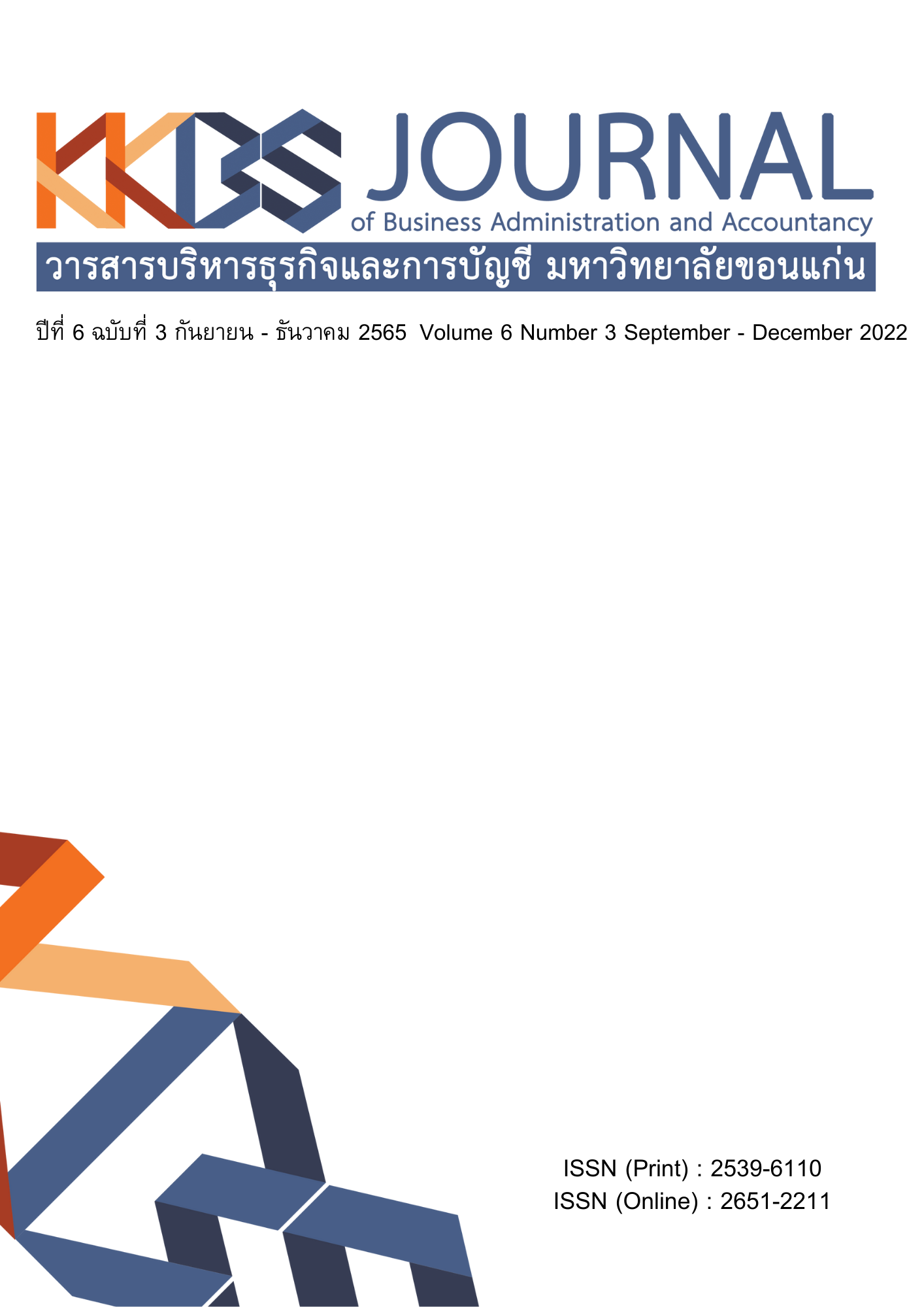Stock Returns Predictability and Adaptive Market Hypothesis
Main Article Content
Abstract
This study is examining the predictability of stock returns and adaptive market hypothesis in the Stock Exchange of Thailand (SET) by using the Variance ratio test in 3 different methods including Lo-Mackinlay Variance Ratio (LMVR), Multiple Variance Ratio (MV), and Wild Bootstrap Multiple Variance Ratio (WBMV). The empirical result shows that an overall market is unpredictable, both before and after The United State of America’s financial crisis. However, we found that the MSCI/SET small-cap is not followed the EMH. Furthermore, we also investigate the Adaptive market hypothesis by using MV and WBMV with Rolling Windows framework and it represents that MSCI/SET large-cap and MSCI/SET small-cap are provided efficiency in some periods and inefficiency in some periods.
Article Details

This work is licensed under a Creative Commons Attribution-NonCommercial-NoDerivatives 4.0 International License.
The articles published in the journals are the authors' opinions, not the opinion of the editorial team or administrative staff. The articles published is copyright of the Journal of Business Administration and Accounting, Khon Kaen University.
References
Barberis, N., Shleifer, A. & Vishny, R. (1998). A model of investor sentiment. Journal of Financial Economics, 49(3), 307-343.
Campbell, J.Y., Lo, A.W. & Mackinlay, A.C. (1996). The econometrics of financial markets. Princeton: Princetion University Press.
Campbell et al. (1997). The econometrics of financial markets. Princeton: Princeton University Press.
Chaimahasan, M. (2005). A testing of Efficient Hypothesis of the Stock Exchange of Thailand (Master Degree), Kasetsart University. (In Thai)
Charles, A., Darne, O. & Kim, J.H. (2012). Exchange-rate return predictability and the adaptive markets hypothesis: Evidence from major foreign exchange rates. Journal of International Money and Finance, 31(6), 1607-1626.
Chow, K.V. & Denning, K.C. (1993). A simple multiple variance ratio test. Journal of Econometrics, 58(3), 385-401.
Fama, E.F. (1970). Efficient capital markets: A review of theory and empirical work. The Journal of Finance, 25(2), 383-417.
Fama, E.F. & French, K.R. (1988). Permanent and temporary components of stock prices. Journal of Political Economy, 96(2), 246-274.
Farmer, J.D. (2002). Market force, ecology, and evolution. Industrial and Corporate Change, 11(5), 895-953.
Farmer, J.D. & Lo, A.W. (1999). Frontiers of finance: Evolution and efficient markets. Proceedings of the National Academy of Sciences of the United States of America, 96(18), 9991-9992.
Grossman, S. (1976). On the efficiency of competitive stock market where trades have diverse information. The Journal of Finance, 31(2), 573-585.
Grossman, S.J. & Stiglitz, J.E. (1980). On the impossibility of informationally efficient markets. The American Economic Review, 70(3), 393-408.
Hong, H. & Jeremy, C.S. (1999). A unified theory of underreaction, momentum trading, and overreaction in asset markets. The Journal of Finance, 54(6), 2143-2184.
Jegadeesh, N. & Titman, S. (1993). Returns to buying winners and selling losers: Implications for stock market efficiency. The Journal of Finance, 48(1), 65-91.
Kahneman, D. & Tversky, A. (1979). Prospect theory: An analysis of decision under Risk./Econometrica, 47(2), 263-291.
Kim, J.H. (2006). Wild bootstrapping variance ratio tests. Economics Letters, 92(1), 38-43.
Kim, J.H. & Shamsuddin, A. (2008). Are Asian stock markets efficient? Evidence from new multiple variance ratio tests. Journal of Empirical Finance, 15(3), 518–532.
Lim, K.P. (2007). Ranking market efficiency for stock markets: A nonlinear perspective. Physica A: Statistical Mechanics and its Applications, 376, 445-454.
Lim, K.-P. & Brook, R. (2008). Nonlinear serial dependence and the weak-form efficiency of Asian emerging stock markets. Journal of International Financial Markets, Institutions and Money, 18(5), 527-544.
Lim, K.-P. & Brooks, R. (2011). The evolution of stock market efficiency over time: A survey of the empirical literature. Journal of Economic Surveys, 25(1), 69-108.
Lo, A. (2004). The adaptive market hypothesis: market efficiency from an evolutionary perspective. The Journal of Portfolio Management, 30(5), 15-29.
Lo, A.W. (1999). The three P's of total risk management. Financial Analysts Journal, 55, 87-129.
Lo, A.W. (2005). Reconciling efficient markets with behavioral finance: The adaptive Markets hypothesis. Journal of Investment Consulting, 7(2), 21-41.
Lo, A.W. & MacKinlay, A.C. (1989). The size and power of the variance ratio test in finite samples: A Monte Carlo investigation. Journal of Econometrics, 40(2), 203-238.
Lommes, G. & Sugden, R. (1982). Regret theory: An alternative theory of rational choice under uncertainty. The Economic Journal, 92(368), 805-824.
Noda, A. (2016). A test of the adaptive market hypothesis using a time-varying AR model in Japan. Finance Research Letters, 17, 66-71.
Simon, H.A. (1955). A behavioral model of rational choice. The Quarterly Journal of Economics, 69(1), 99-118.
Sodsai, R. & Suksonghong, K. (2018). Does market capitalization matters? Tests of weak form efficient hypothesis for Thai stock market. International Journal of Monetary Economics and Finance, 11(3), 235-242.
Urquhart, A. & McGoarty, F. (2016, 10). Are stock markets really efficient? Evidence of the adaptive market hypothesis. International Review of Financial Analysis, 47, 39-49.
Watcharananunt, W. (2007). Test of weak-form efficiency in Stock Exchange of Thailand. Bangkok: Kasetsart University. (In Thai)


